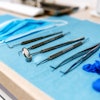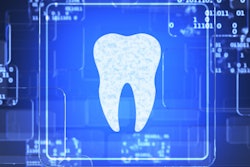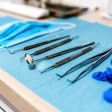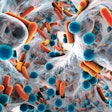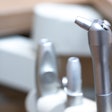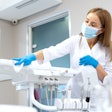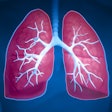
Dentists continue to have lower COVID-19 rates than other front-line health professionals more than a year after the pandemic appeared in the U.S., according to a study published in the June issue of the Journal of the American Dental Association.
The cumulative infection prevalence rate was 2.6% over a six-month period, based on the number of dentists with confirmed or probable SARS-CoV-2 infection, concluded the study authors, led by Dr. Marcelo Araujo, PhD, from the ADA Science & Research Institute. The monthly incidence rate varied, ranging from 0.2% to 1.1%. The data were collected from June through November 2020 (JADA, Vol. 152:6, pp. 425-433).
In comparison, other research indicates the cumulative COVID-19 prevalence rate in June 2020 for U.S. health professionals ranged from 3.3% for Chicago-based hospital physicians to 35.3% for U.S.-based emergency medicine services, according to a statement from the ADA.
"We're pleased to see that dentists have demonstrated continued low monthly incidence of disease despite several regional and national COVID-19 rate spikes during the study period," Araujo noted in the statement.
This study is a continuation of the first large-scale report of incidence rates of COVID-19 among dentists in the U.S., published in October 2020. The current study aimed to determine the cumulative prevalence rate of COVID-19 among dentists, calculate the monthly incidence rate for the same population over the course of the study, and assess the level of engagement in specific infection control practices among dentists over a six-month period of time.
The findings of both studies show that prevalence and incidence rates among dentists continue to be very low when compared with rates for the population as a whole and for other healthcare professionals.
"This study shows high rates of pre-appointment screening of patients and appropriate infection control measures throughout the study period, demonstrating that adhering to very strict protocols for enhanced infection control helps protect their patients, their dental team and themselves," Araujo stated.
In terms of future research, Araujo and colleagues plan to investigate barriers and facilitators to wearing personal protective equipment (PPE) according to recommendations from the U.S. Centers for Disease Control and Prevention. They also plan to study levels of protection against COVID-19 provided by different levels of PPE use and infection control procedures.

